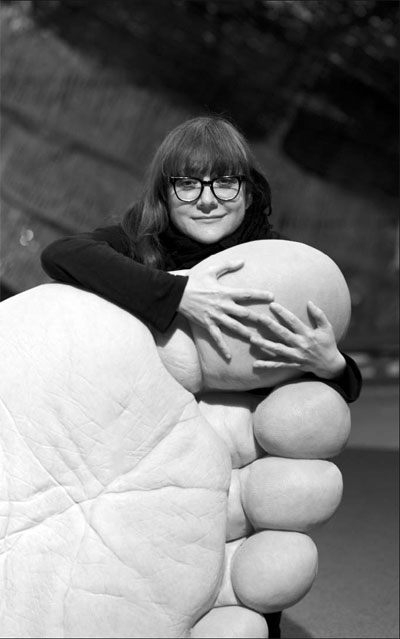Life and Leisure
For baby and me
By Shi Yingying (China Daily)
Updated: 2010-09-20 09:57
 |
Large Medium Small |
|
Spanish film director Isabel Coixet with the giant baby Miguelin. Provided to China Daily |
Director Isabel Coixet's singular ideas about filmmaking also find expression at the Spain Pavilion of the Shanghai Expo. Shi Yingying reports
Visitors to the Spain Pavilion at the Shanghai Expo 2010 may be surprised to discover that its impressive, 6.5-meter-high animated giant baby, Miguelin, is the brainchild not of designers or engineers, but of a film director.
"I was asked to do something to tell Chinese audiences about Spain in the future, and the first thing that jumped to my mind was a baby," says Isabel Coixet.
"If we are really fighting to have better air quality, better cars and better houses, it's for our children.
"A big baby can represent that and a big baby can make you think about it," she says.
Her unique idea for the Expo mirrors the approach she takes in her films.
Despite her Spanish heritage, Coixet's films are not about Spain. Fans of her films shot in Canada and Japan, including My Life Without Me, The Secret Life of Words, Elegy and Map of the Sounds of Tokyo, may not even be aware of Coixet's lineage.
"The borders between countries are illusions for me. Some directors feel comfortable telling stories that belong to their territory, but I'm the opposite," Coixet says.
"One of the greatest things about being a director is that it gives you the freedom to make films everywhere."
Coixet likens movie-making to catching a virus - the kind you can never get rid of, "no matter what".
Now 50, the award-winning filmmaker's interest in cinema goes back to her childhood. Coixet spent a lot of time in cinema halls, growing up with a grandmother who worked in the box office.
"I'm a very good member of the audience," Coixet says. "You put me in the cinema - good films, bad films, Westerns, war films, political films, romance or comedy - I can sit there all day long and learn from everything."
With Spanish directors such as Pedro Almodovar (Talk to Her, All About My Mother, Volver) and Alejandro Amenabar (The Others, The Sea Inside, Agora) in the international spotlight, a controversy about "what makes Spanish cinema Spanish" has erupted not only among the Spanish, but also global audiences.
Unlike Chinese or Iranian cinema, both of which are recognizable to global audiences, Spanish cinema does not have a defining feature.
Coixet, however, does not see this as a drawback. "I think the good thing about Spanish films is that you can't say there is Spanish cinema. It's very difficult to say what we (Coixet and other Spanish directors) have in common," she says.
"We explore a variety of themes, point of views, landscapes and sensibilities, and that's a good thing."
The history major also does not see a clear demarcation between documentary and drama. "My documentary is about real drama and tragedy," she says, referring to her film on Sarajevo's victims of torture, made six years ago.
"I interviewed 85 women who had been raped several times during the war. For me, it's very important to be the witness for these women, to become their memories and to help prevent its recurrence."
Coixet also dismisses a commonly-held belief that one can tell a director's gender through his or her films, although most of her films focus on the struggles of complex female protagonists.
In her latest movie Map of the Sounds of Tokyo (2009), Coixet takes her explorations to Japan. Spanish actor Sergi Lopez plays a wine shop owner in Tokyo while Japanese actress Rinko Kikuchi is the young fishmonger and hired killer.
The clash of their vastly different worlds is just one example of what Coixet is able to produce by mixing cultures.
